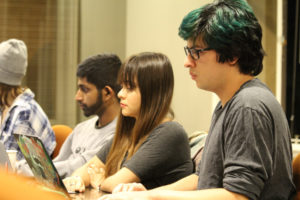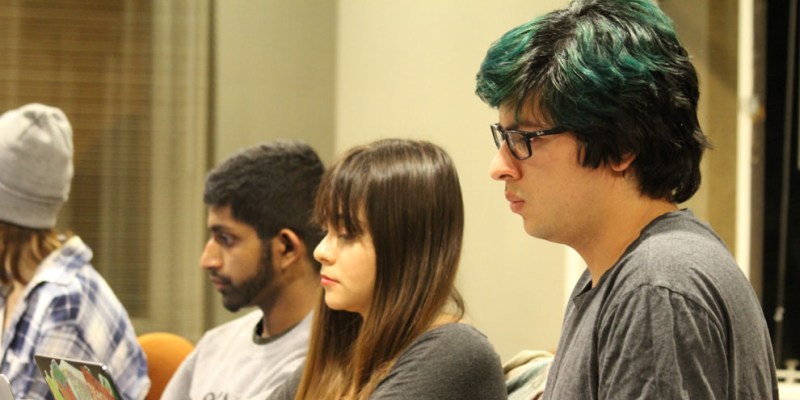On Tuesday night, the 18th Undergraduate Senate discussed a resolution condemning Stanford’s decision to drop Title IX attorney Crystal Riggins following her critical comments about the University’s sexual assault review process. The group also addressed issues with recording and archiving Senate meetings and brainstormed its vision for the future in preparation for a meeting with President Marc Tessier-Lavigne next week.
Resolution condemning Riggins’ treatment
The Senate discussed a potential motion to craft a joint resolution with the Graduate Student Council (GSC) condemning Stanford’s action against Riggins, one of six lawyers the University has on retainer to provide legal services to students involved in Title IX complaints. Riggins was the only lawyer on Stanford’s panel who solely represented accusers.

The Senate discussed a resolution criticizing Stanford’s dismissal of Title IX lawyer Crystal Riggins.
After Riggins expressed her frustrations with Stanford’s sexual assault complaint review process in a statement to The New York Times last December, the University notified Riggins that she was no longer a Stanford-sponsored Title IX attorney.
For Senate Chair Shanta Katipamula ’19, dropping Riggins raises two issues.
“One concern is that the people that are available to both parties are, at the moment, all coming from the defense attorney perspective,” Katipamula said. “The second concern is that the same [attorneys] are provided to both parties, and some of the same people defend on both sides, [presenting a conflict of interest].”
The resolution would express three messages to Stanford.
First, the resolution states that the ASSU “is frustrated by the continued dismissal of criticisms of Stanford’s Title IX processes.” In addition, it disagrees with Riggins’ dismissal, asks that she receive an apology and requests that she be reinstated as a “Stanford-sponsored Title IX Attorney.” Finally, the resolution requests that Stanford add additional lawyers to its list of Stanford-sponsored Title IX attorneys “who specialize in representing the complaining party with an emphasis on hiring those who have identities outside those currently represented on the University’s list.”
The Senate will reach out to the GSC to determine whether the resolution will be a joint one; regardless of the GSC’s support, senators will move forward with the motion next week after talking to Senior Associate Vice Provost of Institutional Equity and Access Lauren Schoenthaler.
Archiving senate meetings
Communications Committee Chair Junwon Park ’19 presented two amendments to a previous bill that requires the Senate to record and archive its meetings for public record.
The new amendment will allow other members of the communications committee to record the session if Park is not present. In the case that no communications committee members are present, Park will delegate the task to another senator.
“In the case of my sudden death or disappearance, we would still be able to uphold [the bill] because any committee member or present Senator [will record],” Park said.
The amendment would also mandate that the Senate upload the recordings within 72 hours onto an online database.
Vision for the future
In preparation for the ASSU Executives’ meeting with Tessier-Lavigne next week, senators brainstormed goals for the future that they would like to discuss with the University president.
Senator Khaled Aounallah ’19 expressed the need for more funding for community centers. Advocacy Committee Chair Jasmin Espinosa ’18 raised concerns about financial aid policies making it difficult to secure project grants and funding from Stanford during non-enrollment periods such as spring break. Sean Means ’18, Assistant Financial Manager for SSE, echoed this sentiment, adding concerns about how securing funding affects financial aid packages.
Other goals included increasing student involvement in the University’s search committees for leadership roles and emphasizing the importance of a liberal arts education by introducing initiatives and career fairs geared toward humanities majors.
Referring to the proposal to condemn Stanford’s action against Riggins, Chairman of the Academic Affairs Committee Gabe Rosen ’19 advocated for increased transparency in Stanford’s processes and policies regarding recent executive orders affecting students.
“It’s important for the president to understand that this is a very unique time in American history, and we are going to do our best to make sense of it,” Rosen said. “He needs to understand that as representatives of the student body, we are going to do our best to act on behalf of the students.”
The Senate also approved funding for Stanford Women’s Coalition and Stanford Gospel Choice events, as well as a request for $6,000 to fund Alpha Phi’s annual “Mr. Alpha Phi” beauty pageant charity event.
Contact Tia Schwab at kbschwab ‘at’ stanford.edu.
